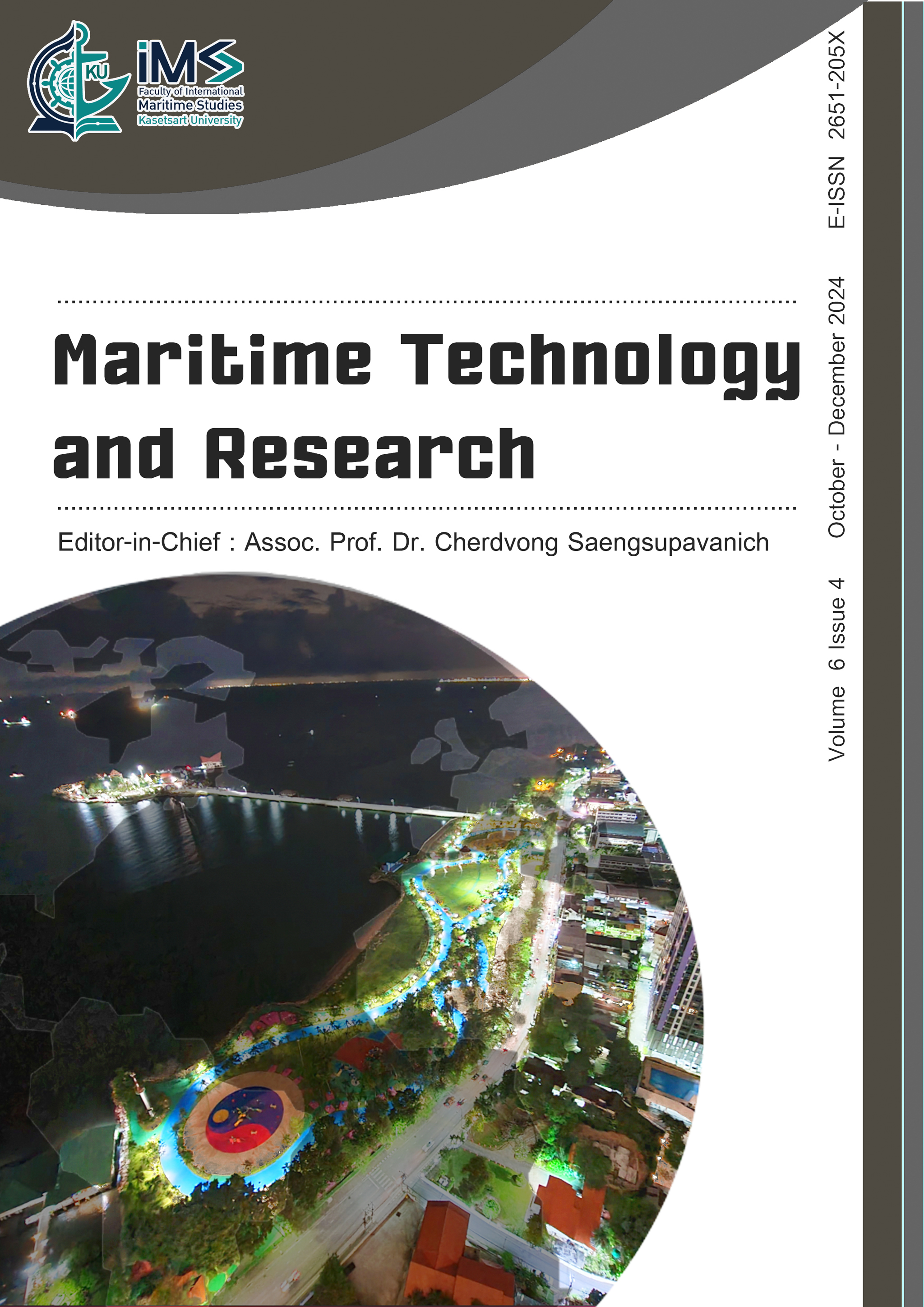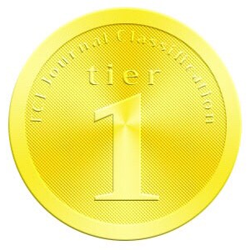21st century learning skills of maritime faculty in the Province of Antique, Philippines
DOI:
https://doi.org/10.33175/mtr.2024.270545Keywords:
The 21st century learning skills; Maritime education; Maritime facultyAbstract
The demands of the 21st century require educators to adapt and empower themselves with essential traits and skills to cope with the changes and bridge the gap, as they play a significant role in shaping the lives and careers of their students. This descriptive-correlational study aimed to determine the 21st century learning skills of maritime faculty in the Province of Antique, Philippines. The data gathering instrument used was a researcher-constructed questionnaire on 21st century skills, adapted from the study of Kelly et al. (2019), which was revised, contextualized to the local setting, and duly validated by a jury composed of five members. The statistical tools were mean, frequency, and percentage for descriptive analysis; the Mann-Whitney U test; and the Kruskal-Wallis H test for inferential analysis. The alpha level was set at 0.05. The study found that, generally, maritime faculty had a high level of 21st century learning skills. A significant difference existed in the maritime faculty’s level of skills in 21st century learning in terms of communication and media fluency when classified as to the length of service as a seafarer. No significant difference existed in the maritime faculty’s level of skills in 21st century learning in terms of collaboration, teamwork, and leadership skills; critical thinking and problem-solving skills; or creativity and innovation skills when grouped according to age, civil status, length of service as faculty, length of service as a seafarer, and educational attainment. Further, in terms of the communication and media skills of maritime faculty, no significant difference was found to exist when they were grouped according to age, civil status, length of service as faculty, and length of service as a seafarer.
------------------------------------------------------------------------------
Cite this article:
APA Style:
Galicia, P.R.B., Maravillas, N.C., Samillano, R.M., Huera, C.A.V., & Pechuanco, F.L.M. (2024). 21st century learning skills of maritime faculty in the Province of Antique, Philippines. Maritime Technology and Research, 6(4), 270545. https://doi.org/10.33175/mtr.2024.270545
MDPI Style:
Galicia, P.R.B.; Maravillas, N.C.; Samillano, R.M.; Huera, C.A.V.; Pechuanco, F.L.M. 21st century learning skills of maritime faculty in the Province of Antique, Philippines. Marit. Technol. Res. 2024, 6(4), 270545. https://doi.org/10.33175/mtr.2024.270545
Vancouver Style:
Galicia PRB, Maravillas NC, Samillano RM, Huera CAV, Pechuanco FLM. (2024). 21st century learning skills of maritime faculty in the Province of Antique, Philippines. Marit. Technol. Res. 6(4): 270545. https://doi.org/10.33175/mtr.2024.270545
------------------------------------------------------------------------------
Highlights
- 21st-century skills are essential in the modern classroom
- By participating in capacity-building workshops, maritime faculty can enhance their 21st century skills
- Young maritime faculty with short seafaring experience must gain more seafaring experience to integrate those experiences into teaching strategies essential to the 21st century classroom
- To benefit digital natives, old and experienced maritime faculty must embrace change by using modern teaching methods and strategies
- Lifelong learning must be encouraged among maritime faculty, which is an essential tool for the development of their 21st century skills
References
Chico, P. C. (2018). Embracing changes and challenges of 21st century learning. Sun Star Pampanga. Retrieved from https://www.pressreader.com
Commission on Higher Education. (2018). Enrolment for BS Marine Engineering and BS Marine Transportation by Gender. Maritime Industry Authority (MARINA) Statistical Report 2013-2017.
Creighton, T. B. (2018). Digital natives, digital immigrants, digital learners: An international empirical integrative review of the literature. ICPEL Education Leadership Review.
Dahalan, S. C., Ahmad, A. R., & Awang, M. M. (2020). The effectiveness of the 21st century teaching history module (21-Cthm) towards high order thinking skills. International Journal of Innovation, Creativity and Change, 12(11), 106-120.
Department Memorandum No. 2020-0055. (2020). Interim guidelines on 2019 novel coronavirus acute respiratory disease (2019-nCoV ARD) response in schools and higher education institutions. Department of Health Philippines. Retrieved from https://doh.gov.ph/sites/default/files/health-update/DC2020-0042-Reiteration-of-DM2020-0055-Interim-Guidelines-on-2019-nCoV-ARD-Response-in-Schools-Higher-Education-Institutions.pdf
Estimo, E. (2020). Ship to academe, seafaring to teaching: Seafarer teachers in maritime higher education institutions in the Philippines. Higher Education Research, 5(2), 44-51. https://doi.org/10.11648/j.her.20200502.12
Fatimah, A. S., & Santiana, S. (2017). Teaching in 21st century: Students-teachers’ perceptions of technology use in the classroom. Journal of Linguistic and English Teaching, 2(2), 125-135. https://doi.org/10.24903/sj.v2i2.132
Fraenkel, J. R., Wallen, N. E., & Hyun, H. H. (2012). How to design and evaluate research in education (8th eds.). New York, NY: McGraw-Hill.
Galicia, P. R. B. (2021). Authentic assessment and academic performance of marine transportation students at the university of Antique, Philippines. Australian Journal of Maritime & Ocean Affairs, 14(4), 251-260. https://doi.org/10.1080/18366503.2021.1962081
Galicia, P. R. B. (2022). Authentic assessment and academic performance of Marine Engineering students: A correlational study. Maritime Technology and Research, 4(3), 254984. https://doi.org/10.33175/mtr.2022.254984
International Maritime Organization. (2019). International convention on standards of training, certification and watchkeeping for seafarers, 1978. International Maritime Organization (IMO). Retrieved from https://www.imo.org/en/OurWork/HumanElement/Pages/STCW-Convention.aspx
Jan, H. (2017). Teachers of 21st century: Characteristics and development. Research on Humanities and Social Sciences, 7(9), 50-54.
Jarrahi, M. H., & Eshraghi, A. (2019). Digital natives vs. digital immigrants: A multidimensional view on interaction with social technologies in organizations. Journal of Enterprise Information Management, 32(6), 1051-1070. https://doi.org/10.1108/JEIM-04-2018-0071
Kelley, T. R., Knowles, J. G., Han, J., & Sung, E. (2019). Creating a 21st century skills survey instrument for high school students. American Journal of Educational Research, 7(8), 583-590. https://doi.org/10.12691/education-7-8-7
Martirez, R. C. (2019). Teachers’ capabilities in the 21st century skills among maritime higher education institutions in Region VI: Basis for training resource framework (Ph. D. Dissertation). Doctor of Philosophy in Maritime Education (Curriculum and Assessment). John B. Lacson Foundaiton Maritime University (Arevalo), Iloilo City.
Mills, G. E., & Gay, L. R. (2019). Educational research: Competencies for analysis and application Twelve Edition. Pearson Educational Book.
Mystkowska-Wiertelak, A., & Pawlak, M. (2012). Production-oriented and comprehension-based grammar teaching in the foreign language classroom. New York: Springer. https://doi.org/10.1007/978-3-642-20856-0
Odabaşı, H. F., Akyol Emmungil, E., Atabay, E., & Demir, M. D. (2023). A critical overview of Turkish research on 21st century skills in education: 2017-2022. Qualitative Inquiry in Education: Theory & Practice, 1(1), 29-49. https://doi.org/10.59455/qietp.3
Philippine Overseas Employment Agency. (2016). Revised POEA rules and regulations governing the recruitment and employment of seafarers. POEA. Retrieved from: https://poea.gov.ph/laws&rules/files/2016%20Rules%20Seabased.pdf
Ruettgers, M. (2016). Teacher preparation: 21st century skills and knowledge required. Journal of Education Leadership in Action, 4(1), 4. https://doi.org/10.62608/2164-1102.1062
Sarinas, B. G. S. (2019). Education and competitiveness: How maritime university students perceived their 21st century learning skills. Augustinian, 20(1), 14790.
Sharma, A., & Kim, T. E. (2021). Exploring technical and non-technical competencies of navigators for autonomous shipping. Maritime Policy & Management, 49(6), 831-849. https://doi.org/10.1080/03088839.2021.1914874
Taie, M. (2014). Skill acquisition theory and its important concepts in SLA. Theory and Practice in Language Studies, 4(9), 1971-1976. https://doi.org/10.4304/tpls.4.9.1971-1976
Downloads
Published
Issue
Section
Categories
License
Copyright (c) 2024 Maritime Technology and Research

This work is licensed under a Creative Commons Attribution-NonCommercial-NoDerivatives 4.0 International License.
Copyright: CC BY-NC-ND 4.0








